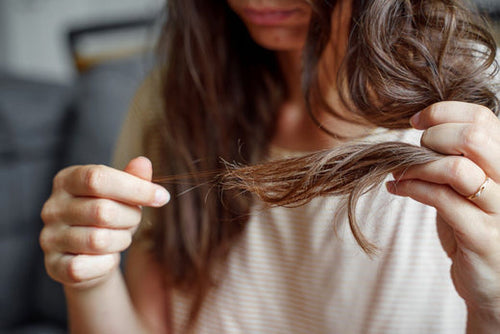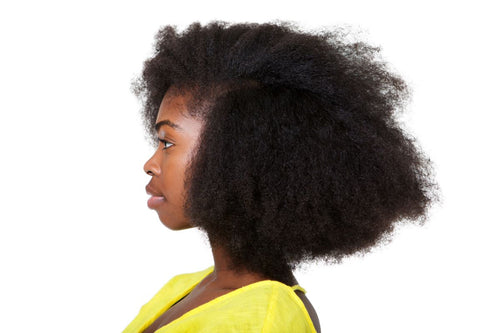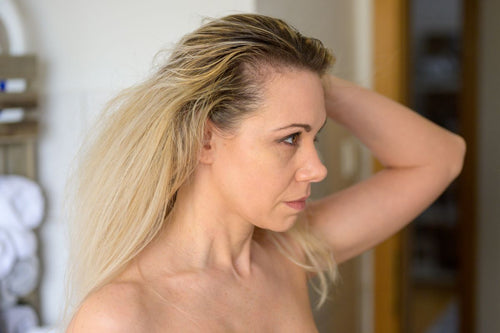In the fast-paced world we live in, stress has become an unavoidable part of daily life for many of us. While the effects of stress on mental and physical health are widely recognized, the impact of stress on hair and scalp health is often underestimated. Stress doesn't just affect our minds and bodies; it can also manifest in various ways that impact the health of our hair. In this article, we’ll delve into six significant ways that stress can influence your hair, shedding light on the delicate relationship between stress and hair health.
1. Telogen Effluvium: The Shedding Effect
Telogen effluvium is a common response to stress and it leads to excessive and distressing hair shedding. Telogen effluvium happens when stress triggers a large number of hair follicles to prematurely enter the resting phase, leading to increased hair shedding. Stress, particularly chronic stress, can be a significant trigger for telogen effluvium. Research has shown that stress hormones, such as cortisol, can disrupt the normal hair growth cycle, contributing to this shedding effect.
2. Hormonal Imbalance and Hair Loss
Stress can disrupt the delicate balance of hormones in the body, including cortisol and adrenaline. Prolonged stress can lead to hormonal imbalances, resulting in increased hair loss and hair thinning. Studies have highlighted the impact of stress-induced hormonal changes on hair follicles. Stress has been shown to reduce the number of hairs in the anagen (growing) phase of the hair cycle and has been also associated with hair loss conditions like alopecia areata, which can cause bald spots on the scalp. This supports the importance of stress management for maintaining healthy hair.
3. Scalp Health and Stress
The health of our scalp plays a crucial role in the overall well-being of our hair. Stress can directly affect the scalp, leading to conditions such as dandruff, scalp inflammation, and reduced blood flow to hair follicles. Conditions like seborrheic dermatitis and scalp psoriasis can flare during times of stress, leading to scalp inflammation and increased hair loss. Research has indicated that stress-related inflammation can disrupt the scalp's natural environment, negatively impacting hair growth and quality.
4. Nutritional Deficiencies and Stress
During times of stress, the body's nutritional requirements may change, potentially resulting in deficiencies in essential vitamins and minerals crucial for hair health. Stress-induced nutritional deficiencies, such as low levels of iron, vitamin D, and B vitamins, can impact hair health. Including a variety of nutrient-rich foods in your diet can help support hair health. Foods rich in biotin (vitamin B7), such as eggs and nuts, can support healthy hair growth. Iron-rich foods like spinach and lentils help combat hair loss due to iron deficiency anemia. Additionally, omega-3 fatty acids found in fish, chia seeds, and walnuts can help nourish the scalp and support hair health.
5. Premature Graying Due to Stress
While genetics play a significant role in determining when we start to gray, stress can expedite this process. Research suggests that stress can induce oxidative stress in hair follicles, leading to a complex biological cascade that ends in premature graying. Antioxidant scalp treatments are used to combat oxidative stress and cell damage. Understanding how stress impacts hair pigmentation is essential for maintaining a youthful appearance.
6. Hair Breakage and Stress
Stress can lead to nutritional deficiencies that weaken the hair shaft, making it more susceptible to breakage and damage. Weakened hair strands may be more prone to conditions like traction alopecia hair loss. Managing stress effectively is crucial for preventing hair breakage and maintaining the integrity of our hair.
FAQ: Stress Induced Hair Loss
Q: What are the symptoms of hair loss due to stress?
A: Hair loss due to stress can appear in several ways. Common signs of stress hair loss include:
• More hair in the shower drain and on bathroom floor
• A thinner look to your hair
• Thinner hair at your temples
• More stray hairs on your pillowcase and bedding
Other common symptoms of hair loss due to stress include increased shedding, thinning of the hair, noticeable bald patches, and changes in the hair texture or quality. Additionally, some people might experience scalp irritation or discomfort. Stress-related hair loss often occurs diffusely all over the scalp rather than in specific patterns, which are more typical of male or female pattern baldness.
Q: Can stress cause permanent hair loss?
A: Typically, stress-induced hair loss, like telogen effluvium, is not permanent, only temporary. It usually resolves when the stress has been removed (or managed) and your system regains its balance and ‘steady state.’ However, chronic stress might contribute to conditions like androgenetic alopecia, which can be permanent if left unmanaged.
Q: How can I reduce stress-related hair loss?
A: Engaging in stress-reducing activities such as meditation, exercise, adequate sleep, and a balanced diet can help reduce the impact of stress on hair health. You can also incorporate antioxidant scalp care products into your hair care routine to help defend your hair from oxidative stress caused by stress.
Q: Are there specific anti-stress products that can help improve hair health?
A: Anti-stress products containing ingredients like adaptogens, vitamins, and minerals that support overall well-being can indirectly benefit hair health by reducing stress levels in the body. Adaptogens are a group of unique stress-protective herbs and plants that help your body adapt and respond to various stressors, promoting balance and resilience. They help regulate your body’s stress-response, which is crucial for managing stress. By incorporating an adaptogenic tea into your daily routine, you can experience a multitude of stress-protective advantages for your hair and scalp.
Q: Can professional hair treatments help combat stress-related hair issues?
A: Professional treatments such as scalp massages, aromatherapy, and nourishing hair masks can improve scalp health and promote relaxation, potentially reducing stress-related hair problems.
The Takeaway
By understanding the intricate relationship between stress and hair health, individuals can take proactive steps to manage stress effectively and maintain healthy, vibrant hair. Incorporating anti-stress adaptogens into your scalp care routine and maintaining a balanced and healthy diet can help reduce the impact of stress on your hair. Remember, addressing both mental and physical well-being is essential for nurturing your hair from the inside out.
References:
Thom E. Stress and the Hair Growth Cycle: Cortisol-Induced Hair Growth Disruption. https://pubmed.ncbi.nlm.nih.gov/27538002/
https://www.aad.org/news/stress-shows-in-skin-hair-nails
Dhariwala MY, Ravikumar P. An overview of herbal alternatives in androgenetic alopecia. https://pubmed.ncbi.nlm.nih.gov/30980598/
Quist, S.R., Quist, J. Keep quiet—how stress regulates hair follicle stem cells. https://www.nature.com/articles/s41392-021-00772-4#citeas
Tosti A, Schwartz JR. Role of scalp health in achieving optimal hair growth and retention. https://pubmed.ncbi.nlm.nih.gov/33932025/
Lopresti AL. The Effects of Psychological and Environmental Stress on Micronutrient Concentrations in the Body: A Review of the Evidence. https://www.ncbi.nlm.nih.gov/pmc/articles/PMC7442351/





